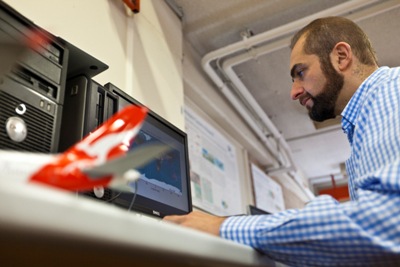The University of Sydney has inked a four-year partnership agreement with Qantas for the development of a flight planning system, which will facilitate Qantas to get optimized route profile, enhance operational efficiency and reduce fuel usage.
 Professor Salah Sukkarieh
Professor Salah Sukkarieh
The Qantas Future Flight Planning Project (QFFPP) is based on a proven pilot program that focused on the development and manifestation of a commercial aviation flight-planning system prototype.
The prototype system was on the basis of the new research in stochastic optimization and planning and applied in software utilizing data provided by Qantas. It integrated all the related route profile, aircraft performance and aerodynamics into the optimization algorithms, which were built upon Dynamic Programming principles and showed better precision and operational efficiency.
Professor Salah Sukkarieh, Director of Research and Innovation at Australian Centre for Field Robotics, informed that the initial work focused on ways of using flight mechanics, aerodynamics, machine learning algorithms and large-scale optimization to create efficient fuel prediction models and flight planning routines. This partnership will open the door for improved flight routes that will enhance operational efficacy for Qantas, adding value to its present target of an innovative navigation technology and complementing greener commercial aviation.
The deal with the University of Sydney will focus on further development of the system in addition to exploring operational factors like traffic flow and weather avoidance. Up to 10 PhD students and 6 research fellows will benefit from this project.
According to Qantas’ Head of Operations Support, Peter Broschofsky, the airline anticipates the replacement of its existing flight planning systems by QFFPP within four years, combined with considerable improvements in operational efficiency due to latest ground and aircraft technology. More efficient flying is Qantas’ top operational priority as it will improve the airline’s performance, while decreasing fuel consumption and carbon emissions. The system under development by Professor Sukkarieh is in line with the airline’s long-term commitment towards intelligent technologies like Required Navigation Performance.